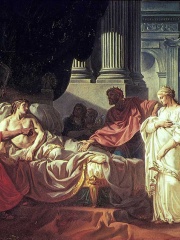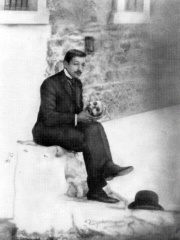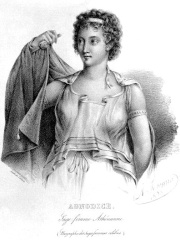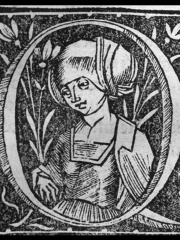





The Most Famous
PHYSICIANS from Greece
This page contains a list of the greatest Greek Physicians. The pantheon dataset contains 726 Physicians, 7 of which were born in Greece. This makes Greece the birth place of the 22nd most number of Physicians behind Denmark, and Sweden.
Top 7
The following people are considered by Pantheon to be the most legendary Greek Physicians of all time. This list of famous Greek Physicians is sorted by HPI (Historical Popularity Index), a metric that aggregates information on a biography's online popularity.

1. Hippocrates (460 BC - 370 BC)
With an HPI of 90.19, Hippocrates is the most famous Greek Physician. His biography has been translated into 121 different languages on wikipedia.
Hippocrates of Kos (; Ancient Greek: Ἱπποκράτης ὁ Κῷος, romanized: Hippokrátēs ho Kôios; c. 460 – c. 370 BC), also known as Hippocrates II, was a Greek physician and philosopher of the classical period who is considered one of the most outstanding figures in the history of medicine. He is traditionally referred to as the "Father of Medicine" in recognition of his lasting contributions to the field, such as the use of prognosis and clinical observation, the systematic categorization of diseases, and the (later discredited) formulation of humoral theory. His studies set out the basic ideas of modern-day specialties, including surgery, urology, neurology, acute medicine and orthopedics, and advanced the systematic study of clinical medicine. The Hippocratic school of medicine revolutionized ancient Greek medicine, establishing it as a discipline distinct from other fields with which it had traditionally been associated (theurgy and philosophy), thus establishing medicine as a profession. Hippocrates is also widely recognized for his contributions to medical ethics, being credited with the Hippocratic Oath that remains in use today. Works associated with Hippocrates, called the Hippocratic Corpus, also summed up the medical knowledge of previous schools, and prescribed acceptable practices for physicians. Nevertheless, very little is known concretely about what Hippocrates himself thought, wrote and did, because his achievements were often conflated with those of the practitioners of Hippocratic medicine and the writers of the Hippocratic Corpus.

2. Erasistratus (303 BC - 249 BC)
With an HPI of 69.05, Erasistratus is the 2nd most famous Greek Physician. His biography has been translated into 33 different languages.
Erasistratus (; Ancient Greek: Ἐρασίστρατος; c. 304 – c. 250 BC) was a Greek anatomist and royal physician under Seleucus I Nicator of Syria. Along with fellow physician Herophilus, he founded a school of anatomy in Alexandria, where they carried out anatomical research. As well, he is credited with helping to found the methodic school of teachings of medicine in Alexandria whilst opposing traditional humoral theories of Hippocratic ideologies. Together with Herophilus, he is credited by historians as the potential founder of neuroscience due to his acknowledgements of nerves and their roles in motor control through the brain and skeletal muscles. Furthermore, Erasistratus is seen as one of the first physicians/scientists to conduct recorded dissections and potential vivisections alongside Herophilus. The two physicians were said by several Roman authors, notably Augustine, Celsus, and Tertullian, to have performed controversial vivisections on criminals to study the anatomy and possible physiology of human organs while they were in Alexandria. Because of their research, Erasistratus and Herophilus were heavily criticized for their utilization of vivisections; specifically, by the author Tertullian who followed Christian values. Erasistratus and Herophilus are thought to be the only physicians to perform systematic dissections on the human body until the Renaissance. Erasistratus is credited for his description of the valves of the heart, and he also concluded that the heart was not the center of sensations, but that it instead functioned as a pump. He was among the first to distinguish between veins and arteries, believing that the arteries were full of air and that they carried the "animal spirit" (pneuma). He considered atoms to be the essential body element, and he believed they were vitalized by the pneuma that circulated through the nerves. He also thought that the nerves moved a nervous spirit from the brain. He then differentiated between the function of the sensory and motor nerves, and linked them to the brain. He is credited with one of the first in-depth descriptions of the cerebrum and cerebellum. Erasistratus is regarded by some as the founder of physiology.

3. Georgios Papanikolaou (1883 - 1962)
With an HPI of 68.56, Georgios Papanikolaou is the 3rd most famous Greek Physician. His biography has been translated into 39 different languages.
Georgios Nikolaou Papanikolaou (or George Papanicolaou ; Greek: Γεώργιος Ν. Παπανικολάου [papanikoˈlau]; 13 May 1883 – 19 February 1962) was a Greek physician, zoologist and microscopist who was a pioneer in cytopathology and early cancer detection, and inventor of the pap smear for detection of cervical cancer. After studying medicine in Greece and Germany, in 1913 he emigrated to the United States and was on the faculty at Cornell Medical College. He first reported that uterine cancer cells could be detected in vaginal smears in 1928, but his work was not widely recognized until the 1940s. An extensive trial of his techniques was carried out in the early 1950s. In 1961 he was invited to the University of Miami to lead and develop there the Papanicolaou Cancer Research Institute.

4. Agnodice (400 BC - 360 BC)
With an HPI of 68.41, Agnodice is the 4th most famous Greek Physician. Her biography has been translated into 33 different languages.
Agnodice (Greek: Ἁγνοδίκη, pronounced [haŋnodíkɛː]; c. 4th century BCE) is a legendary figure said to be the first female midwife or physician in ancient Athens. Her story, originally told in the Fabulae (attributed to the Roman author Gaius Julius Hyginus), has been used to illustrate issues surrounding women in medicine and midwifery. Agnodice is not generally considered a historical figure, but her legend has influenced discussions about gender roles in medical professions. According to Hyginus, Agnodice studied medicine under the famous physician Herophilus. Because Athenian laws prohibited women from practicing medicine, Agnodice disguised herself as a man to work as a physician. As her popularity grew among female patients, rival male physicians accused her of seducing her clients. During her trial, she revealed her identity by lifting her tunic in a gesture known as anasyrma, proving she was a woman. Although accused of illegally practicing medicine, Agnodice was defended by the women of Athens, who praised her skill and dedication. She was ultimately acquitted, and the law prohibiting female physicians was revoked.

5. Paul of Aegina (625 - 690)
With an HPI of 65.28, Paul of Aegina is the 5th most famous Greek Physician. His biography has been translated into 25 different languages.
Paul of Aegina or Paulus Aegineta (Greek: Παῦλος Αἰγινήτης; Aegina, c. 625 – c. 690) was a 7th-century Byzantine Greek physician best known for writing the medical encyclopedia Medical Compendium in Seven Books. He is considered the “Father of Early Medical Writing”. For many years in the Byzantine Empire, his work contained the sum of all available medical knowledge and was unrivaled in its accuracy and completeness.

6. Podalirius (b. 0)
With an HPI of 62.28, Podalirius is the 6th most famous Greek Physician. His biography has been translated into 21 different languages.
In Greek mythology, Podalirius or Podaleirius or Podaleirios (Ancient Greek: Ποδαλείριος) was a son of Asclepius.

7. Diocles of Carystus (400 BC - 300 BC)
With an HPI of 59.23, Diocles of Carystus is the 7th most famous Greek Physician. His biography has been translated into 15 different languages.
Diocles of Carystus (; Greek: Διοκλῆς ὁ Καρύστιος; Latin: Diocles Carystius; also known by the Latin name Diocles Medicus, i.e. "Diocles the physician"; c. 375 BC – c. 295 BC) was a well-regarded Greek physician, born in Carystus, a city on Euboea, Greece. His significance was as a major thinker, practitioner, and writer of the fourth century.
People
Pantheon has 7 people classified as Greek physicians born between 460 BC and 1883. Of these 7, none of them are still alive today. The most famous deceased Greek physicians include Hippocrates, Erasistratus, and Georgios Papanikolaou.
Deceased Greek Physicians
Go to all RankingsHippocrates
460 BC - 370 BC
HPI: 90.19
Erasistratus
303 BC - 249 BC
HPI: 69.05
Georgios Papanikolaou
1883 - 1962
HPI: 68.56
Agnodice
400 BC - 360 BC
HPI: 68.41
Paul of Aegina
625 - 690
HPI: 65.28
Podalirius
HPI: 62.28
Diocles of Carystus
400 BC - 300 BC
HPI: 59.23

